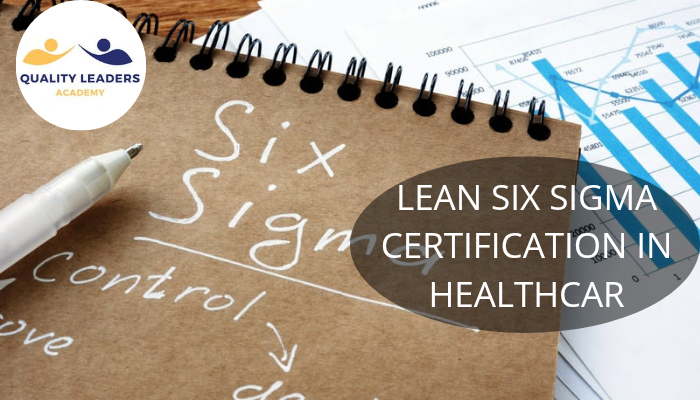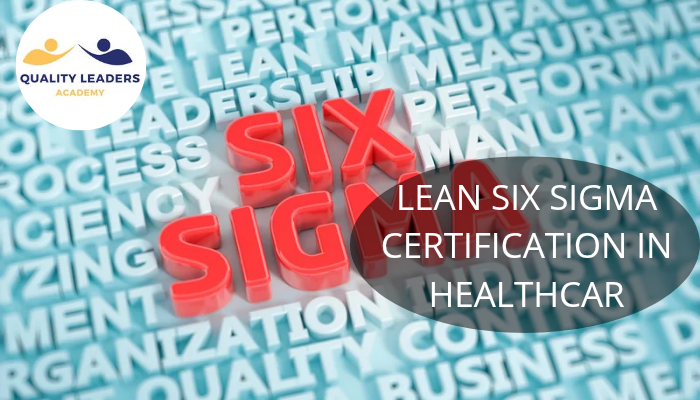In today’s fast-paced healthcare environment, improving patient safety, reducing medical errors, and optimizing hospital workflows are critical to delivering high-quality patient care. Lean Six Sigma Certification is one of the most effective methodologies for achieving these goals.
By obtaining a Lean Six Sigma Certification, healthcare professionals gain the skills and tools to enhance operational efficiency, eliminate waste, and drive continuous process improvement. This certification is widely recognized for its ability to streamline healthcare delivery while ensuring cost-effective, high-quality care.
This article explores Lean Six Sigma Certification, its importance in healthcare, and how professionals can benefit from earning a Lean Six Sigma Black Belt.
WHAT IS LEAN SIX SIGMA CERTIFICATION?

Lean Six Sigma is a data-driven methodology that combines two powerful frameworks:
- Lean: Focuses on eliminating waste, improving workflow efficiency, and enhancing resource utilization.
- Six Sigma: Aims to reduce process variation and improve quality through statistical analysis and process control.
When applied in healthcare, Lean Six Sigma Certification enables professionals to optimize patient care, enhance safety, and improve hospital operations. Hospitals and clinics worldwide implement Lean Six Sigma strategies to reduce inefficiencies and improve overall patient experiences.
WHY IS LEAN SIX SIGMA CERTIFICATION IMPORTANT IN HEALTHCARE?
Earning a Lean Six Sigma Certification equips healthcare professionals with proven problem-solving tools to enhance patient care delivery and operational efficiency. Here’s why it matters:
1. Reducing Medical Errors
Medical errors are a leading cause of preventable patient harm. Lean Six Sigma tools such as Root Cause Analysis (RCA) and Failure Mode and Effects Analysis (FMEA) help identify risks, minimize mistakes, and implement solutions to prevent errors in diagnosis, medication administration, and surgical procedures.
2. Improving Patient Satisfaction
Patient experience plays a crucial role in healthcare quality. Lean Six Sigma methodologies optimize:
- Appointment scheduling to reduce wait times.
- Communication between patients and providers
Service delivery efficiency
These improvements lead to higher patient satisfaction scores and better healthcare outcomes.
3. Enhancing Healthcare Efficiency
Many healthcare organizations struggle with delayed treatments, resource mismanagement, and administrative bottlenecks. Lean Six Sigma Certification helps professionals identify inefficiencies, eliminate redundant steps, and streamline hospital workflows, leading to smoother patient care.
4. Cost Reduction Without Compromising Quality
Hospitals face financial challenges due to wasteful spending and inefficient resource allocation. Lean Six Sigma Black Belt professionals apply process improvement techniques to reduce costs while maintaining or improving patient care quality.
5. Strengthening Compliance with Accreditation Standards
Hospitals must meet regulatory requirements from organizations such as CBAHI, JCI, and ISO 9001. Lean Six Sigma principles ensure standardized processes, risk reduction, and compliance with healthcare quality benchmarks.
KEY APPLICATIONS OF LEAN SIX SIGMA IN HEALTHCARE
Hospitals and healthcare institutions use Lean Six Sigma to enhance:
- Emergency Department Efficiency: Reducing patient wait times and optimizing triage systems.
- Surgical Process Improvement: Minimizing surgery delays and optimizing operating room utilization.
- Hospital-Acquired Infections (HAIs) Prevention: Standardizing sterilization protocols and improving hygiene compliance.
- Patient Discharge Optimization – Eliminating administrative delays to improve hospital bed turnover
These applications make Lean Six Sigma Certification an essential qualification for healthcare leaders, administrators, and quality improvement professionals.
HOW TO GET LEAN SIX SIGMA CERTIFIED?
To earn a Lean Six Sigma Certification, candidates must:
- Complete a structured training program covering Lean Six Sigma methodologies.
- Apply Six Sigma tools in a real-world project.
- Pass a certification exam conducted by recognized organizations such as ASQ, IASSC, or CSSC
Choosing an accredited training provider is crucial for obtaining recognized certification in the healthcare industry.
RECOMMENDED LEAN SIX SIGMA BLACK BELT COURSE FOR HEALTHCARE PROFESSIONALS
If you are looking for a high-quality Lean Six Sigma Black Belt course tailored for healthcare professionals, we recommend, Quality Leaders Academy course.
Why Choose Quality Leaders Academy?
- Expert-led training with real-world healthcare case studies.
- Comprehensive study materials covering Lean Six Sigma tools and techniques.
- Flexible learning options: Choose between live Zoom sessions or recorded sessions.
- Accredited certification recognized in healthcare quality management.
Enroll today at Quality Leaders Academy and become a certified Lean Six Sigma Black Belt in healthcare!
IS LEAN SIX SIGMA CERTIFICATION WORTH IT?

Incorporating Lean Six Sigma Certification into healthcare practices is a powerful strategy for enhancing patient safety, reducing errors, and improving hospital efficiency.
Lean Six Sigma Black Belt professionals play a critical role in improving healthcare quality by leading process improvement projects, reducing costs, and ensuring compliance with accreditation standards.
For those looking to advance their careers in healthcare quality management, Lean Six Sigma Certification is a valuable investment.
Take the next step in your career and enroll in the Quality Leaders Academy Lean Six Sigma Black Belt Course today.


